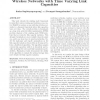Free Online Productivity Tools
i2Speak
i2Symbol
i2OCR
iTex2Img
iWeb2Print
iWeb2Shot
i2Type
iPdf2Split
iPdf2Merge
i2Bopomofo
i2Arabic
i2Style
i2Image
i2PDF
iLatex2Rtf
Sci2ools
ICC
2009
IEEE
2009
IEEE
Joint Flow Control, Routing and Medium Access Control in Random Access Multi-Hop Wireless Networks
This work extends the existing static framework for joint flow control, routing and medium access control (MAC) in random access multi-hop wireless networks to a dynamic framework where link capacities vary over time. The overall problem is formulated as a long term network utility maximization (NUM) problem (instead of the existing static NUM problem) that accounts for link capacity variation. This dynamic formulation is more realistic than the static one, and is one step closer to practical networks. Under the stationary and ergodic assumptions on the link capacity variation, the problem is decomposed to form a distributed algorithm. The algorithm samples current link capacities while it is iteratively and locally updating flow rates and link transmission probabilities. Simulation results demonstrate the ability of the algorithm to sustain the optimal average data rates despite the link capacity variation.
Related Content
| Added | 21 May 2010 |
| Updated | 21 May 2010 |
| Type | Conference |
| Year | 2009 |
| Where | ICC |
| Authors | Sucha Supittayapornpong, Poompat Saengudomlert |
Comments (0)

